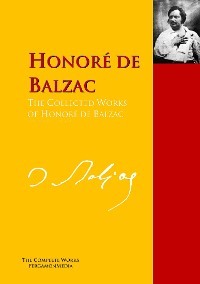
Полная версия
Ursula
"You!" exclaimed the post master to the clerk, who stood rubbing his hands, "making game of our misfortunes already?"
As Goupil was known to have pandered to Dionis' passions for the last five years, the post master treated him cavalierly, without suspecting the hoard of ill-feeling he was piling up in Goupil's heart with every fresh insult. The clerk, convinced that money was more necessary to him than it was to others, and knowing himself superior in mind to the whole bourgeoisie of Nemours, was now counting on his intimacy with Minoret's son Desire to obtain the means of buying one or the other of three town offices,—that of clerk of the court, or the legal practice of one of the sheriffs, or that of Dionis himself. For this reason he put up with the affronts of the post master and the contempt of Madame Minoret-Levrault, and played a contemptible part towards Desire, consoling the fair victims whom that youth left behind him after each vacation,—devouring the crumbs of the loaves he had kneaded.
"If I were the nephew of a rich old fellow, he never would have given God to ME for a co-heir," retorted Goupil, with a hideous grin which exhibited his teeth—few, black, and menacing.
Just then Massin-Levrault, junior, the clerk of the court, joined his wife, bringing with him Madame Cremiere, the wife of the tax-collector of Nemours. This man, one of the hardest natures of the little town, had the physical characteristics of a Tartar: eyes small and round as sloes beneath a retreating brow, crimped hair, an oily skin, huge ears without any rim, a mouth almost without lips, and a scanty beard. He spoke like a man who was losing his voice. To exhibit him thoroughly it is enough to say that he employed his wife and eldest daughter to serve his legal notices.
Madame Cremiere was a stout woman, with a fair complexion injured by red blotches, always too tightly laced, intimate with Madame Dionis, and supposed to be educated because she read novels. Full of pretensions to wit and elegance, she was awaiting her uncle's money to "take a certain stand," decorate her salon, and receive the bourgeoisie. At present her husband denied her Carcel lamps, lithographs, and all the other trifles the notary's wife possessed. She was excessively afraid of Goupil, who caught up and retailed her "slapsus-linquies" as she called them. One day Madame Dionis chanced to ask what "Eau" she thought best for the teeth.
"Try opium," she replied.
Nearly all the collateral heirs of old Doctor Minoret were now assembled in the square; the importance of the event which brought them was so generally felt that even groups of peasants, armed with their scarlet umbrellas and dressed in those brilliant colors which make them so picturesque on Sundays and fete-days, stood by, with their eyes fixed on the frightened heirs. In all little towns which are midway between large villages and cities those who do not go to mass stand about in the square or market-place. Business is talked over. In Nemours the hour of church service was a weekly exchange, to which the owners of property scattered over a radius of some miles resorted.
"Well, how would you have prevented it?" said the post master to Goupil in reply to his remark.
"I should have made myself as important to him as the air he breathes. But from the very first you failed to get hold of him. The inheritance of a rich uncle should be watched as carefully as a pretty woman—for want of proper care they'll both escape you. If Madame Dionis were here she could tell you how true that comparison is."
"But Monsieur Bongrand has just told me there is nothing to worry about," said Massin.
"Oh! there are plenty of ways of saying that!" cried Goupil, laughing. "I would like to have heard your sly justice of the peace say it. If there is nothing to be done, if he, being intimate with your uncle, knows that all is lost, the proper thing for him to say to you is, 'Don't be worried.'"
As Goupil spoke, a satirical smile overspread his face, and gave such meaning to his words that the other heirs began to feel that Massin had let Bongrand deceive him. The tax-collector, a fat little man, as insignificant as a tax-collector should be, and as much of a cipher as a clever woman could wish, hereupon annihilated his co-heir, Massin, with the words:—"Didn't I tell you so?"
Tricky people always attribute trickiness to others. Massin therefore looked askance at Monsieur Bongrand, the justice of the peace, who was at that moment talking near the door of the church with the Marquis du Rouvre, a former client.
"If I were sure of it!" he said.
"You could neutralize the protection he is now giving to the Marquis du Rouvre, who is threatened with arrest. Don't you see how Bongrand is sprinkling him with advice?" said Goupil, slipping an idea of retaliation into Massin's mind. "But you had better go easy with your chief; he's a clever old fellow; he might use his influence with your uncle and persuade him not to leave everything to the church."
"Pooh! we sha'n't die of it," said Minoret-Levrault, opening his enormous snuff-box.
"You won't live of it, either," said Goupil, making the two women tremble. More quick-witted than their husbands, they saw the privations this loss of inheritance (so long counted on for many comforts) would be to them. "However," added Goupil, "we'll drown this little grief in floods of champagne in honor of Desire!—sha'n't we, old fellow?" he cried, tapping the stomach of the giant, and inviting himself to the feast for fear he should be left out.
CHAPTER II. THE RICH UNCLE
Before proceeding further, persons of an exact turn of mind may like to read a species of family inventory, so as to understand the degrees of relationship which connected the old man thus suddenly converted to religion with these three heads of families or their wives. This cross-breeding of families in the remote provinces might be made the subject of many instructive reflections.
There are but three or four houses of the lesser nobility in Nemours; among them, at the period of which we write, that of the family of Portenduere was the most important. These exclusives visited none but nobles who possessed lands or chateaus in the neighbourhood; of the latter we may mention the d'Aiglemonts, owners of the beautiful estate of Saint-Lange, and the Marquis du Rouvre, whose property, crippled by mortgages, was closely watched by the bourgeoisie. The nobles of the town had no money. Madame de Portenduere's sole possessions were a farm which brought a rental of forty-seven hundred francs, and her town house.
In opposition to this very insignificant Faubourg St. Germain was a group of a dozen rich families, those of retired millers, or former merchants; in short a miniature bourgeoisie; below which, again, lived and moved the retail shopkeepers, the proletaries and the peasantry. The bourgeoisie presented (like that of the Swiss cantons and of other small countries) the curious spectacle of the ramifications of certain autochthonous families, old-fashioned and unpolished perhaps, but who rule a whole region and pervade it, until nearly all its inhabitants are cousins. Under Louis XI., an epoch at which the commons first made real names of their surnames (some of which are united with those of feudalism) the bourgeoisie of Nemours was made up of Minorets, Massins, Levraults and Cremieres. Under Louis XIII. these four families had already produced the Massin-Cremieres, the Levrault-Massins, the Massin-Minorets, the Minoret-Minorets, the Cremiere-Levraults, the Levrault-Minoret-Massins, Massin-Levraults, Minoret-Massins, Massin-Massins, and Cremiere-Massins,—all these varied with juniors and diversified with the names of eldest sons, as for instance, Cremiere-Francois, Levrault-Jacques, Jean-Minoret—enough to drive a Pere Anselme of the People frantic,—if the people should ever want a genealogist.
The variations of this family kaleidoscope of four branches was now so complicated by births and marriages that the genealogical tree of the bourgeoisie of Nemours would have puzzled the Benedictines of the Almanach of Gotha, in spite of the atomic science with which they arrange those zigzags of German alliances. For a long time the Minorets occupied the tanneries, the Cremieres kept the mills, the Massins were in trade, and the Levraults continued farmers. Fortunately for the neighbourhood these four stocks threw out suckers instead of depending only on their tap-roots; they scattered cuttings by the expatriation of sons who sought their fortune elsewhere; for instance, there are Minorets who are cutlers at Melun; Levraults at Montargis; Massins at Orleans; and Cremieres of some importance in Paris. Divers are the destinies of these bees from the parent hive. Rich Massins employ, of course, the poor working Massins—just as Austria and Prussia take the German princes into their service. It may happen that a public office is managed by a Minoret millionaire and guarded by a Minoret sentinel. Full of the same blood and called by the same name (for sole likeness), these four roots had ceaselessly woven a human network of which each thread was delicate or strong, fine or coarse, as the case might be. The same blood was in the head and in the feet and in the heart, in the working hands, in the weakly lungs, in the forehead big with genius.
The chiefs of the clan were faithful to the little town, where the ties of family were relaxed or tightened according to the events which happened under this curious cognomenism. In whatever part of France you may be, you will find the same thing under changed names, but without the poetic charm which feudalism gave to it, and which Walter Scott's genius reproduced so faithfully. Let us look a little higher and examine humanity as it appears in history. All the noble families of the eleventh century, most of them (except the royal race of Capet) extinct to-day, will be found to have contributed to the birth of the Rohans, Montmorencys, Beauffremonts, and Mortemarts of our time,—in fact they will all be found in the blood of the last gentleman who is indeed a gentleman. In other words, every bourgeois is cousin to a bourgeois, and every noble is cousin to a noble. A splendid page of biblical genealogy shows that in one thousand years three families, Shem, Ham, and Japhet, peopled the globe. One family may become a nation; unfortunately, a nation may become one family. To prove this we need only search back through our ancestors and see their accumulation, which time increases into a retrograde geometric progression, which multiplies of itself; reminding us of the calculation of the wise man who, being told to choose a reward from the king of Persia for inventing chess, asked for one ear of wheat for the first move on the board, the reward to be doubled for each succeeding move; when it was found that the kingdom was not large enough to pay it. The net-work of the nobility, hemmed in by the net-work of the bourgeoisie,—the antagonism of two protected races, one protected by fixed institutions, the other by the active patience of labor and the shrewdness of commerce,—produced the revolution of 1789. The two races almost reunited are to-day face to face with collaterals without a heritage. What are they to do? Our political future is big with the answer.
The family of the man who under Louis XV. was simply called Minoret was so numerous that one of the five children (the Minoret whose entrance into the parish church caused such interest) went to Paris to seek his fortune, and seldom returned to his native town, until he came to receive his share of the inheritance of his grandfather. After suffering many things, like all young men of firm will who struggle for a place in the brilliant world of Paris, this son of the Minorets reached a nobler destiny than he had, perhaps, dreamed of at the start. He devoted himself, in the first instance, to medicine, a profession which demands both talent and a cheerful nature, but the latter qualification even more than talent. Backed by Dupont de Nemours, connected by a lucky chance with the Abbe Morellet (whom Voltaire nicknamed Mords-les), and protected by the Encyclopedists, Doctor Minoret attached himself as liegeman to the famous Doctor Bordeu, the friend of Diderot, D'Alembert, Helvetius, the Baron d'Holbach and Grimm, in whose presence he felt himself a mere boy. These men, influenced by Bordeu's example, became interested in Minoret, who, about the year 1777, found himself with a very good practice among deists, encyclopedists, sensualists, materialists, or whatever you are pleased to call the rich philosophers of that period.
Though Minoret was very little of a humbug, he invented the famous balm of Lelievre, so much extolled by the "Mercure de France," the weekly organ of the Encyclopedists, in whose columns it was permanently advertised. The apothecary Lelievre, a clever man, saw a stroke of business where Minoret had only seen a new preparation for the dispensary, and he loyally shared his profits with the doctor, who was a pupil of Rouelle in chemistry as well as of Bordeu in medicine. Less than that would make a man a materialist.
The doctor married for love in 1778, during the reign of the "Nouvelle Heloise," when persons did occasionally marry for that reason. His wife was a daughter of the famous harpsichordist Valentin Mirouet, a celebrated musician, frail and delicate, whom the Revolution slew. Minoret knew Robespierre intimately, for he had once been instrumental in awarding him a gold medal for a dissertation on the following subject: "What is the origin of the opinion that covers a whole family with the shame attaching to the public punishment of a guilty member of it? Is that opinion more harmful than useful? If yes, in what way can the harm be warded off." The Royal Academy of Arts and Sciences at Metz, to which Minoret belonged, must possess this dissertation in the original. Though, thanks to this friendship, the Doctor's wife need have had no fear, she was so in dread of going to the scaffold that her terror increased a disposition to heart disease caused by the over-sensitiveness of her nature. In spite of all the precautions taken by the man who idolized her, Ursula unfortunately met the tumbril of victims among whom was Madame Roland, and the shock caused her death. Minoret, who in tenderness to his wife had refused her nothing, and had given her a life of luxury, found himself after her death almost a poor man. Robespierre gave him an appointment as surgeon-in-charge of a hospital.
Though the name of Minoret obtained during the lively debates to which mesmerism gave rise a certain celebrity which occasionally recalled him to the minds of his relatives, still the Revolution was so great a destroyer of family relations that in 1813 Nemours knew little of Doctor Minoret, who was induced to think of returning there to die, like the hare to its form, by a circumstance that was wholly accidental.
Who has not felt in traveling through France, where the eye is often wearied by the monotony of plains, the charming sensation of coming suddenly, when the eye is prepared for a barren landscape, upon a fresh cool valley, watered by a river, with a little town sheltering beneath a cliff like a swarm of bees in the hollow of an old willow? Wakened by the "hu! hu!" of the postilion as he walks beside his horses, we shake off sleep and admire, like a dream within a dream, the beautiful scene which is to the traveler what a noble passage in a book is to a reader,—a brilliant thought of Nature. Such is the sensation caused by a first sight of Nemours as we approach it from Burgundy. We see it encircled with bare rocks, gray, black, white, fantastic in shape like those we find in the forest of Fontainebleau; from them spring scattered trees, clearly defined against the sky, which give to this particular rock formation the dilapidated look of a crumbling wall. Here ends the long wooded hill which creeps from Nemours to Bouron, skirting the road. At the bottom of this irregular amphitheater lie meadow-lands through which flows the Loing, forming sheets of water with many falls. This delightful landscape, which continues the whole way to Montargis, is like an opera scene, for its effects really seem to have been studied.
One morning Doctor Minoret, who had been summoned into Burgundy by a rich patient, was returning in all haste to Paris. Not having mentioned at the last relay the route he intended to take, he was brought without his knowledge through Nemours, and beheld once more, on waking from a nap, the scenery in which his childhood had been passed. He had lately lost many of his old friends. The votary of the Encyclopedists had witnessed the conversion of La Harpe; he had buried Lebrun-Pindare and Marie-Joseph de Chenier, and Morellet, and Madame Helvetius. He assisted at the quasi-fall of Voltaire when assailed by Geoffroy, the continuator of Freton. For some time past he had thought of retiring, and so, when his post chaise stopped at the head of the Grand'Rue of Nemours, his heart prompted him to inquire for his family. Minoret-Levrault, the post master, came forward himself to see the doctor, who discovered him to be the son of his eldest brother. The nephew presented the doctor to his wife, the only daughter of the late Levrault-Cremiere, who had died twelve years earlier, leaving him the post business and the finest inn in Nemours.
"Well, nephew," said the doctor, "have I any other relatives?"
"My aunt Minoret, your sister, married a Massin-Massin—"
"Yes, I know, the bailiff of Saint-Lange."
"She died a widow leaving an only daughter, who has lately married a Cremiere-Cremiere, a fine young fellow, still without a place."
"Ah! she is my own niece. Now, as my brother, the sailor, died a bachelor, and Captain Minoret was killed at Monte-Legino, and here I am, that ends the paternal line. Have I any relations on the maternal side? My mother was a Jean-Massin-Levrault."
"Of the Jean-Massin-Levrault's there's only one left," answered Minoret-Levrault, "namely, Jean-Massin, who married Monsieur Cremiere-Levrault-Dionis, a purveyor of forage, who perished on the scaffold. His wife died of despair and without a penny, leaving one daughter, married to a Levrault-Minoret, a farmer at Montereau, who is doing well; their daughter has just married a Massin-Levrault, notary's clerk at Montargis, where his father is a locksmith."
"So I've plenty of heirs," said the doctor gayly, immediately proposing to take a walk through Nemours accompanied by his nephew.
The Loing runs through the town in a waving line, banked by terraced gardens and neat houses, the aspect of which makes one fancy that happiness must abide there sooner than elsewhere. When the doctor turned into the Rue des Bourgeois, Minoret-Levrault pointed out the property of Levrault-Levrault, a rich iron merchant in Paris who, he said, had just died.
"The place is for sale, uncle, and a very pretty house it is; there's a charming garden running down to the river."
"Let us go in," said the doctor, seeing, at the farther end of a small paved courtyard, a house standing between the walls of the two neighbouring houses which were masked by clumps of trees and climbing-plants.
"It is built over a cellar," said the doctor, going up the steps of a high portico adorned with vases of blue and white pottery in which geraniums were growing.
Cut in two, like the majority of provincial houses, by a long passage which led from the courtyard to the garden, the house had only one room to the right, a salon lighted by four windows, two on the courtyard and two on the garden; but Levrault-Levrault had used one of these windows to make an entrance to a long greenhouse built of brick which extended from the salon towards the river, ending in a horrible Chinese pagoda.
"Good! by building a roof to that greenhouse and laying a floor," said old Minoret, "I could put my book there and make a very comfortable study of that extraordinary bit of architecture at the end."
On the other side of the passage, toward the garden, was the dining-room, decorated in imitation of black lacquer with green and gold flowers; this was separated from the kitchen by the well of the staircase. Communication with the kitchen was had through a little pantry built behind the staircase, the kitchen itself looking into the courtyard through windows with iron railings. There were two chambers on the next floor, and above them, attic rooms sheathed in wood, which were fairly habitable. After examining the house rapidly, and observing that it was covered with trellises from top to bottom, on the side of the courtyard as well as on that to the garden,—which ended in a terrace overlooking the river and adorned with pottery vases,—the doctor remarked:—
"Levrault-Levrault must have spend a good deal of money here."
"Ho! I should think so," answered Minoret-Levrault. "He liked flowers—nonsense! 'What do they bring in?' says my wife. You saw inside there how an artist came from Paris to paint flowers in fresco in the corridor. He put those enormous mirrors everywhere. The ceilings were all re-made with cornices which cost six francs a foot. The dining-room floor is in marquetry—perfect folly! The house won't sell for a penny the more."
"Well, nephew, buy it for me: let me know what you do about it; here's my address. The rest I leave to my notary. Who lives opposite?" he asked, as they left the house.
"Emigres," answered the post master, "named Portenduere."
The house once bought, the illustrious doctor, instead of leaving there, wrote to his nephew to let it. The Folie-Levraught was therefore occupied by the notary of Nemours, who about that time sold his practice to Dionis, his head-clerk, and died two years later, leaving the house on the doctor's hands, just at the time when the fate of Napoleon was being decided in the neighbourhood. The doctor's heirs, at first misled, had by this time decided that his thought of returning to his native place was merely a rich man's fancy, and that probably he had some tie in Paris which would keep him there and cheat them of their hoped-for inheritance. However, Minoret-Levrault's wife seized the occasion to write him a letter. The old man replied that as soon as peace was signed, the roads cleared of soldiers, and safe communications established, he meant to go and live at Nemours. He did, in fact, put in an appearance with two of his clients, the architect of his hospital and an upholsterer, who took charge of the repairs, the indoor arrangements, and the transportation of the furniture. Madame Minoret-Levrault proposed the cook of the late notary as caretaker, and the woman was accepted.
When the heirs heard that their uncle and great-uncle Minoret was really coming to live in Nemours, they were seized (in spite of the political events which were just then weighing so heavily on Brie and on the Gatinais) with a devouring curiosity, which was not surprising. Was he rich? Economical or spendthrift? Would he leave a fine fortune or nothing? Was his property in annuities? In the end they found out what follows, but only by taking infinite pains and employing much subterraneous spying.









